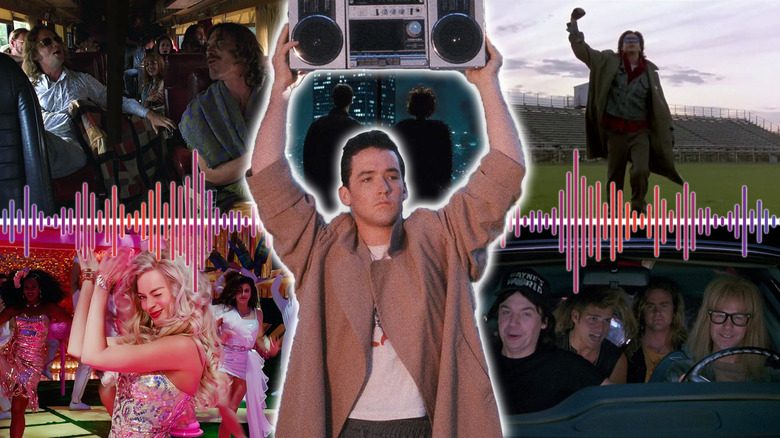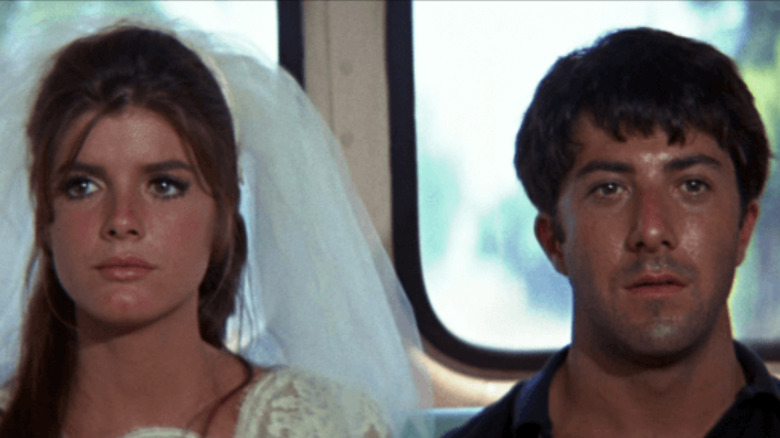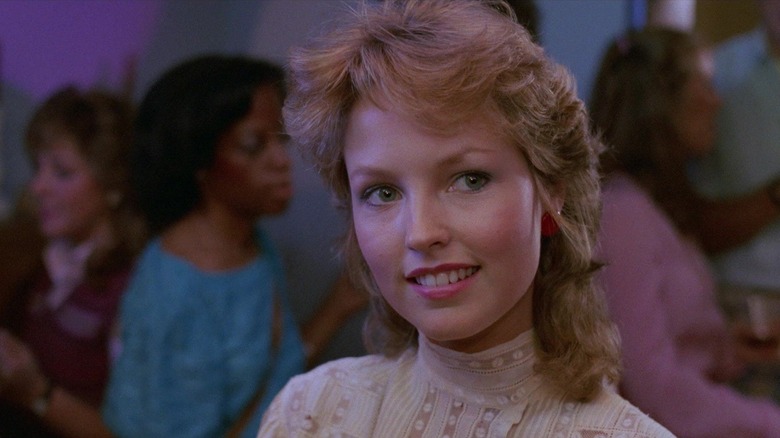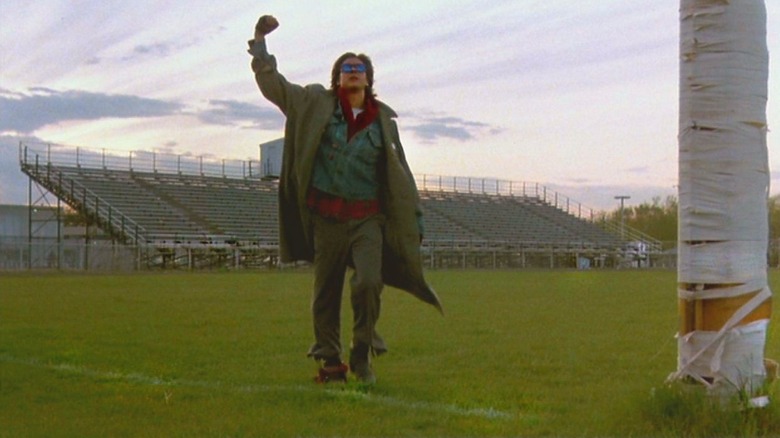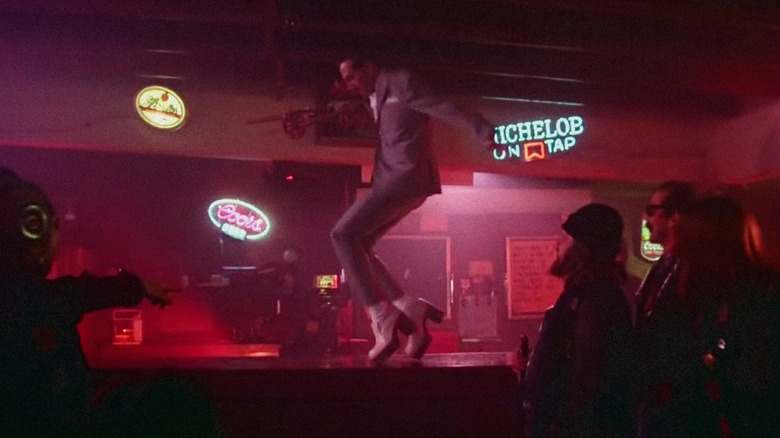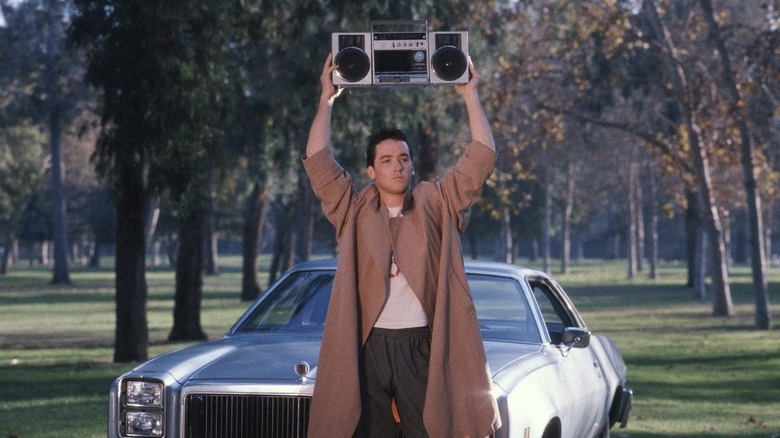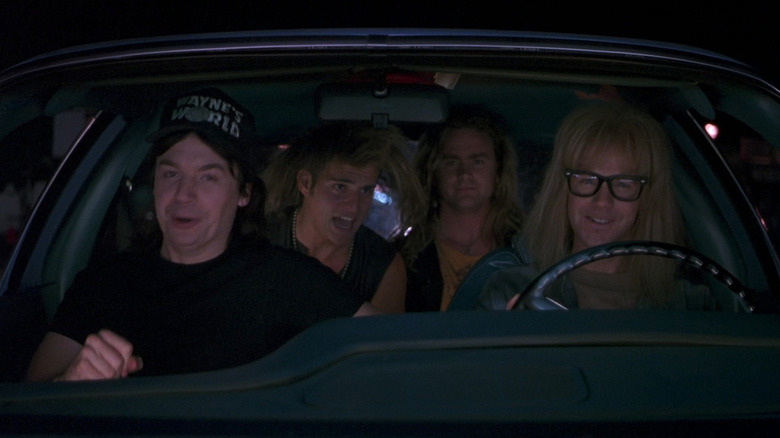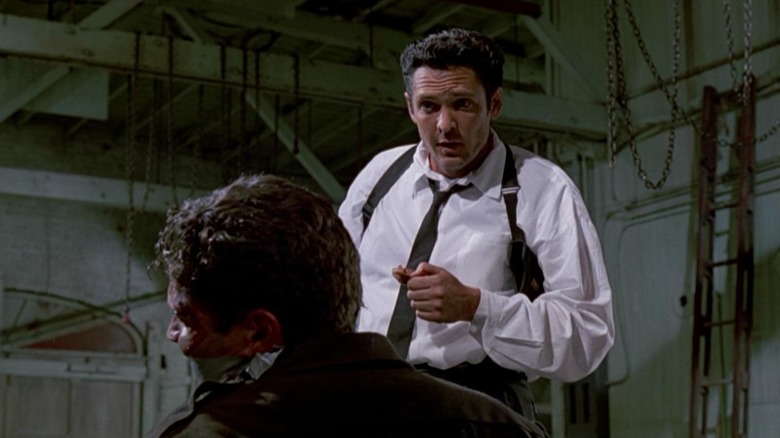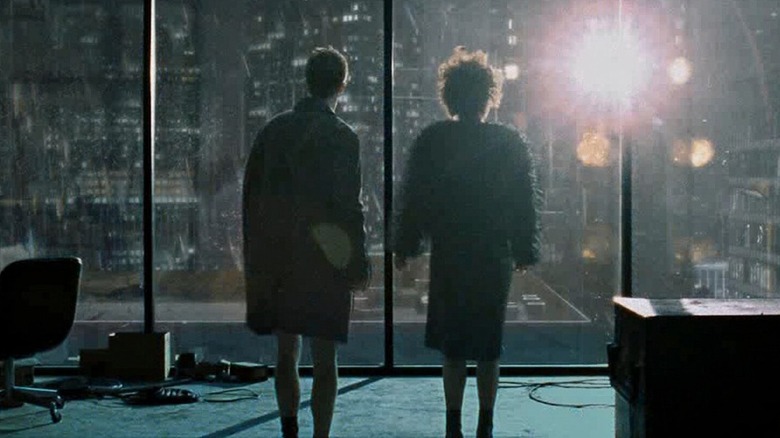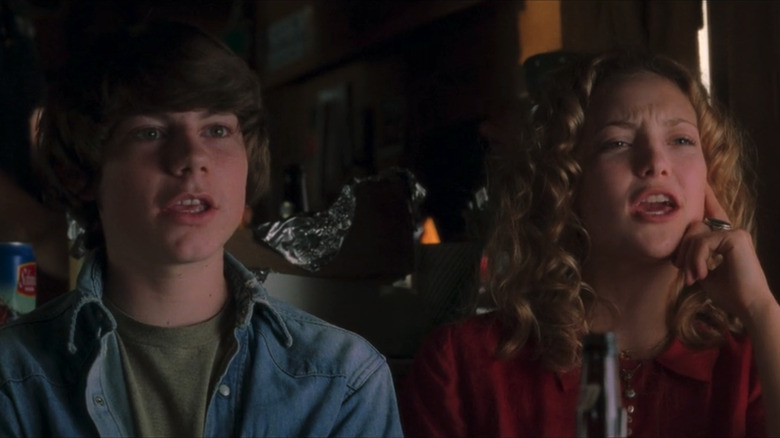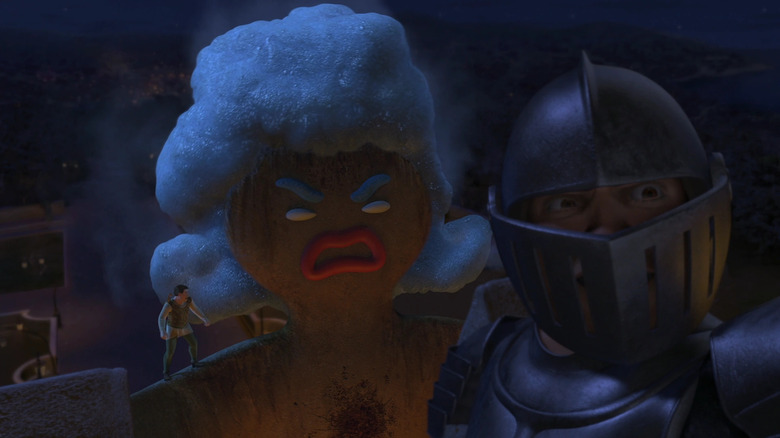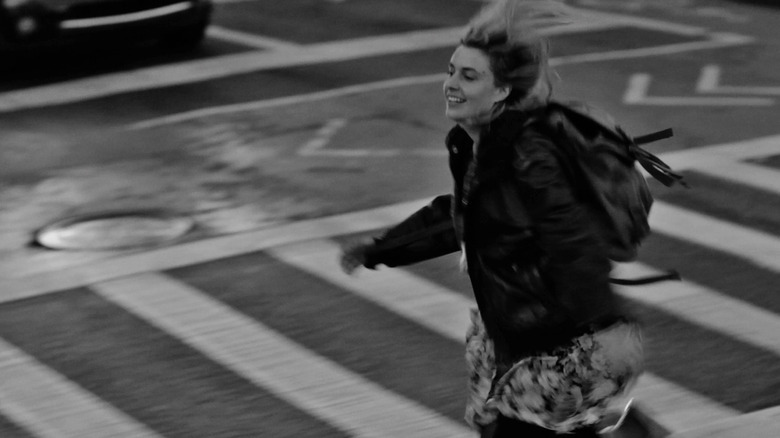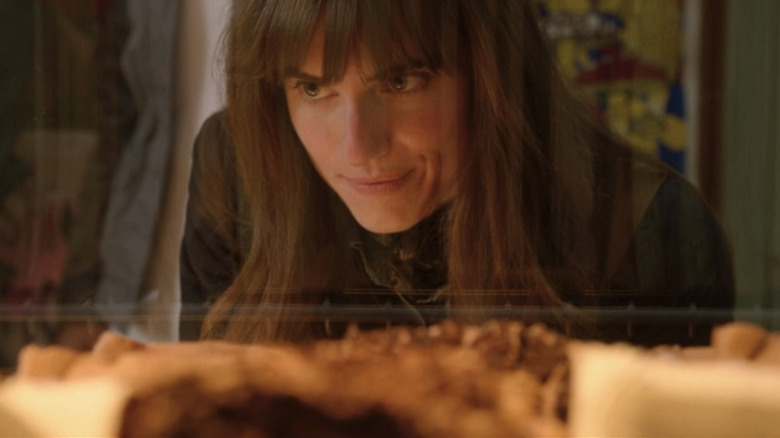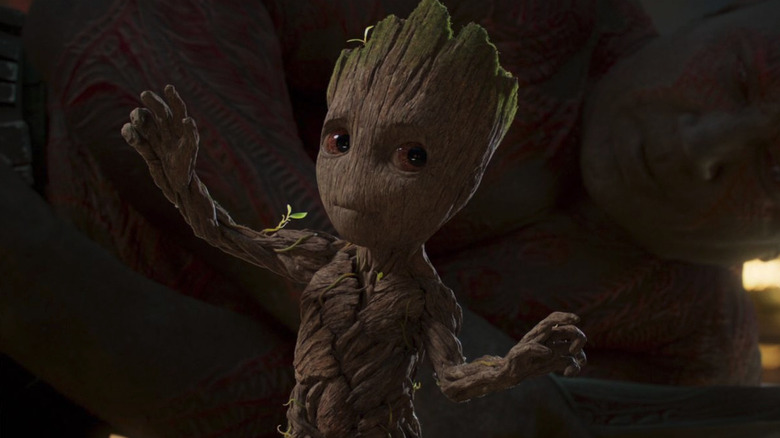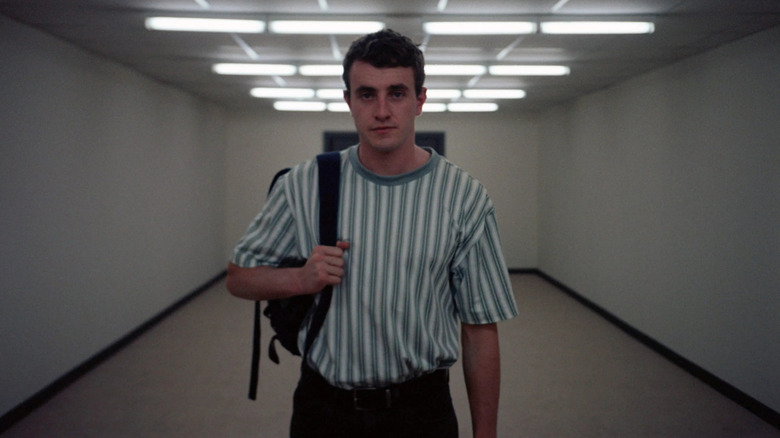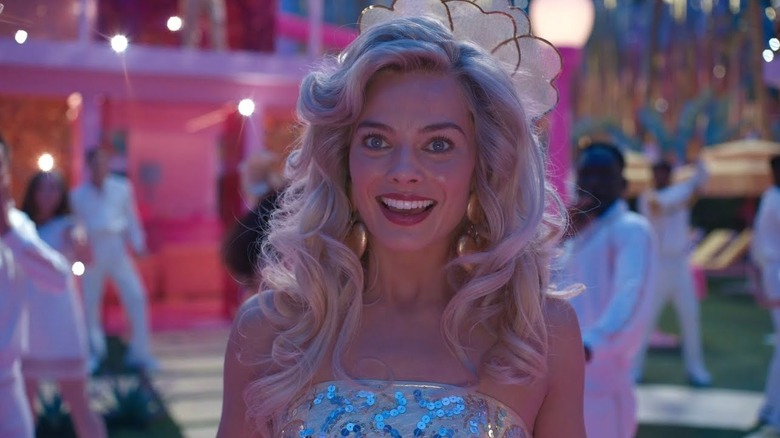15 Best Needle Drops In Movie History
The "needle drop" is a colloquial term for when a movie or TV show uses a song, either written for the piece of media or outside of its context, for a particular scene. Its use can be diegetic or non-diegetic, and in many cases, a needle drop may even take viewers out of a film. Some movies pay big bucks for needle drops, with artists like The Beatles or Led Zeppelin famously charging hefty fees for filmmakers to make use of their iconic songs.
Whatever the cost, these 15 films didn't just make great use out of these popular songs, but they completely redefined their legacies for the foreseeable future. From the humbling sounds of Simon & Garfunkel to the energetic dance-pop of Dua Lipa, let's take a look at the needle drops that prove that, when done right, the combination of an iconic film and an iconic song can make something greater than the sum of its parts.
These are the best needle drops in movie history.
The Sound of Silence - The Graduate
Mike Nichols' "The Graduate" is often considered one of the best movies ever made, despite releasing nearly 60 years ago in 1957. The film is an examination of an illicit affair between the titular Benjamin Braddock (Dustin Hoffman) and the mother (Anne Bancroft) of the woman he's in love with, Elaine (Katharine Ross). Some could argue aspects of the film haven't aged well, but one aspect that definitely has is its soundtrack, which was influential in bolstering the careers of singer-songwriters Paul Simon and Art Garfunkel.
Although the song "Mrs. Robinson" was penned by Simon for the movie specifically, the more iconic moment of the folk duo's music in the film comes with their hit song "The Sound of Silence." After convincing Elaine to abandon her own groom-to-be at the altar, Benjamin and Elaine make it onto a bus, where their expressions of excitement slowly fade as Simon and Garfunkel sing, "Hello darkness, my old friend..." Though the use of this song has been parodied countless times, the actual moment in the film never ceases to twist your heart into knots.
I Melt With You - Valley Girl
"Valley Girl" is arguably one of the greatest '80s romantic comedies, despite being loosely based off of William Shakespeare's tragedy "Romeo & Juliet." Its soundtrack, fittingly for a film released in 1983, is full of bangers by popular artists like The Clash, Culture Club, and The Psychedelic Furs, but the most memorable song used in "Valley Girl" is Modern English's "I Melt With You," which later charted on the Billboard Hot 100 after becoming popularized by the film.
Not only is "I Melt With You" the song that scores the end credits of "Valley Girl," but it also plays during the film's most quintessential '80s rom-com moment, where the titular teenager, Julie (Deborah Foreman), falls for Randy (Nicolas Cage), a punk who she meets at a friend's party. It's also the rare needle drop where the entire song plays in full during the film rather than just one part to emphasize a specific moment. Ever since, Modern English's song has been synonymous with the falling-in-love montage cliche.
Don't You (Forget About Me) - The Breakfast Club
We simply can't talk about needle drops in film history without mentioning John Hughes, who wrote and directed some of the most generation-defining films of the 1980s. Among Hughes' best films is the coming-of-age flick "The Breakfast Club," about a group of misfit teenagers spending a Saturday in detention together, forming bonds that transcend social cliques.
The most iconic moment in "The Breakfast Club" is the very last shot of the film, when "criminal" John Bender (Judd Nelson) leaves detention while pumping his fist into the air, as Simple Minds' song "Don't You (Forget About Me)" plays, transitioning into the end credits. Subsequently, the song hit the coveted number one spot on the Billboard Hot 100 shortly after the release of "The Breakfast Club." Thankfully, it seems that Hughes chose just the right song for this triumphant moment of catharsis that ends the film.
Tequila - Pee-wee's Big Adventure
Danny Elfman's soundtrack is one of the greatest parts of "Pee-wee's Big Adventure," the Tim Burton movie that turned Paul Reubens' stage character into an icon of film history. And yet, despite Elfman's work, the film's most memorable musical moment comes with a song that he didn't write: "Tequila" by The Champs, a song that originally released in 1958, 27 years before "Pee-wee's Big Adventure."
In the movie, Pee-wee finds himself in a dive bar, having earned the ire of a biker gang after knocking over their motorcycles. To convince them not to kick his butt, Pee-wee puts "Tequila" on with the jukebox, dons a set of shoes with platform heels, and does a very peculiar dance on top of the bar counter. Not only does this dance absurdly work at winning over the biker gang, but they even lend Pee-wee a motorcycle of their own, so he can continue his journey of rescuing his bike. Now, anytime you hear "Tequila," you can't not do Pee-wee's dance.
In Your Eyes - Say Anything...
If you're wondering where the iconography of holding a boombox outside someone's window as a profession of love came from, it's Cameron Crowe's "Say Anything..." It's a fairly straight-forward rom-com from Crowe (and not the only film by the director that'll be on this list), following the love story between valedictorian Diane (Ione Skye) and slacker Lloyd (John Cusack). In fact, Cusack was tricked into filming this iconic scene in "Say Anything...," given that the actor felt it was cheesy and out of character.
To the credit of Crowe, Cusack probably didn't know the song that would be soundtracking this moment is Peter Gabriel's "In Your Eyes," which was used instead of the song "A Girl Like You" by The Smithereens, originally written for the movie. The choice was right, as Gabriel's song is now essentially the song that scores the modern-day "Romeo & Juliet" balcony scene.
Bohemian Rhapsody - Wayne's World
There's a lot of lore around the usage of Queen's "Bohemian Rhapsody" in "Wayne's World," and thankfully, Mike Myers got his way. Although Myers created Wayne Campbell long before "Saturday Night Live," the "Wayne's World" sketches turned the character into a pop culture icon, eventually resulting in the 1992 comedy directed by Penelope Spheeris.
Myers specifically wanted the Queen epic to score an early moment in the film where Wayne, Garth (Dana Carvey), and their friends are head-banging in their car, but they faced pushback from producers. While studio executives wanted a Guns n' Roses song for the scene, Myers insisted on "Bohemian Rhapsody," even threatening to quit the movie over it. In honor of the film re-popularizing the song 17 years after its release, Myers was cast in the Freddie Mercury biopic named after the song, playing a record label executive who wrongly claims that no one will bang their heads to a song like "Bohemian Rhapsody." Oh, how wrong that guy must've been in Mike Myers' eyes.
Stuck in the Middle With You - Reservoir Dogs
Nowadays, we've all accepted the fact that Quentin Tarantino is one of the great filmmakers, despite never winning the Oscar for Best Director. But when "Reservoir Dogs" came out in 1992, no one knew the iconic cinema legend he would become. In hindsight, it must've been wild to watch "Reservoir Dogs" blind, unaware of its Tarantino-isms, from its graphic violence to extremely dark humor. Its most darkly humorous moment comes when Michael Madsen's Mr. Blonde, a proven psychopath by this point, tortures a kidnapped cop.
Not only does Mr. Blonde mutilate this cop by cutting off his ear, but he does it all while dancing to "Stuck in the Middle with You" by Stealers Wheel. Notably, it's a much more jovial song than the moment would have you believe, which lends to the scene's brutality as well as its memorability. Unfortunately, it's also the case where many viewers of "Reservoir Dogs" find the song completely ruined by the memory of Mr. Blonde as a character.
Where Is My Mind? - Fight Club
There was potentially a universe in which David Fincher had successfully recruited Thom Yorke of Radiohead to score his 1999 cult classic "Fight Club," but the job instead went to the Dust Brothers, who are instrumental in creating the unique atmosphere of this film that's more nuanced than its reputation suggests, thanks to that ending. What begins as a fight club started by a man and his dissociated identity (Edward Norton's nameless narrator, Brad Pitt's Tyler Durden) morphs into a domestic terrorist group called Project Mayhem.
After "killing" Tyler Durden by shooting himself in the cheek, Norton's character stands in a skyscraper with his lover, Marla (Helena Bonham Carter), as they stare out at a window at collapsing buildings, the work of Project Mayhem. There's simply no other song we could imagine scoring this moment but "Where Is My Mind?" by the Pixies, which turned it from an 11-year-old album track to the band's most popular song.
Tiny Dancer - Almost Famous
As promised, "Almost Famous" is the second film by Cameron Crowe on this list, which is no surprise considering Crowe's background as a Rolling Stone journalist prior to breaking out as a screenwriter and later director. "Almost Famous," released in 2000, is Crowe's most autobiographical film, following a 1970s rock band, Stillwater (Billy Crudup, Jason Lee, Mark Kozelek, and John Fedevich) and their groupie Penny Lane (Kate Hudson) through the eyes of a young music journalist (Patrick Fugit) witnessing their tension amidst rising success.
Aside from the original music by Stillwater, the movie's soundtrack includes songs by The Who, The Beach Boys, Nancy Wilson, and David Bowie, but its best needle drop is courtesy of Elton John's "Tiny Dancer." The song plays on the tour bus of Stillwater following a huge meltdown of Crudup's Russell Hammond, easing tensions as everyone on the bus starts to sing along to the iconic tune. It's easily the most famous scene from the movie, albeit also the one that ruined "Tiny Dancer" for everyone in the cast.
Holding Out for a Hero - Shrek 2
When talking about iconic needle drops in films, there simply has to be a mention of Bonnie Tyler's 1984 single "Holding Out for a Hero," as it's appeared in many movie soundtracks over the years. While it was originally written for "Footloose," its best usage is easily the climax of "Shrek 2" from 2004, in which it's covered by the Fairy Godmother (voiced by Jennifer Saunders) at a royal ball to celebrate the marriage of Princess Fiona (Cameron Diaz) and Shrek (Mike Myers), though Shrek has at this point been ousted in favor of the king and queen's preferred son-in-law, Prince Charming (Rupert Everett).
After the fairy tale creatures rescue Shrek, Donkey (Eddie Murphy), and Puss in Boots (Antonio Banderas) from a dungeon, they storm the king and queen's castle to crash the party while the Fairy Godmother rocks out on stage. For a film filled with great needle drops, including The Counting Crows' "Accidentally in Love" and a cover of "Livin' la Vida Loca" by Murphy and Banderas, the sheer suspense of this action sequence set to "Holding Out for a Hero" cements "Shrek 2" as the best "Shrek" movie.
Modern Love - Frances Ha
Before she made "Barbie," Greta Gerwig starred in and co-wrote "Frances Ha," directed by her future husband Noah Baumbach. The film tells the story of Frances Halladay, whose comfortable life in Brooklyn with her roommate and best friend Sophie (Mickey Summer) is upended when Sophie moves out, leaving Frances bouncing from living situation to living situation, as her most treasured friendship slowly fizzles away. Its soundtrack is also top notch, but its use of one David Bowie song has more meaning than most audiences might understand.
Scoring a scene in which Frances, emboldened by her new life sans Sophie, races through the streets of New York City, Bowie's song "Modern Love" makes for the film's most iconic moment, but it's actually directly inspired by a scene in Leos Carax's 1986 film "Mauvais Sang." It's just one of many references to the French New Wave film movement in "Frances Ha," but its use of a song called "Modern Love" makes the moment feel so... well... modern.
Redbone - Get Out
"Stay woke," Donald Glover, a.k.a. Childish Gambino sings in his 2016 hit "Redbone," off his album "Awaken, My Love!" The song would go on to be nominated for three Grammys and won one, but it took on a whole new meaning for audiences in Jordan Peele's directorial debut, "Get Out," the 2017 film that has redefined the horror genre for the past decade or so. According to Peele, he chose the song for the film's opening scene, feeling it aligned with his goal of making a horror movie for African-American audiences where the main character makes smart choices.
Though "Redbone" only plays once at the top of the film, those words, "Stay woke," reverberate throughout the story as Daniel Kaluuya's Chris witnesses strange occurrences at the home of his girlfriend Rose's (Allison Williams) parents (Bradley Whitford and Catherine Keener). If anything, it also feels like kismet that Peele and Glover got to collaborate in this way, given that they have a lot in common as black men with sketch comedy backgrounds who, by 2016 and 2017, were making big moves to break out into other genres.
Mr. Blue Sky - Guardians of the Galaxy Vol. 2
James Gunn might be the only superhero movie director who has perfectly nailed the art of the needle drop, as evidenced by not just his "Guardians of the Galaxy" movies at Marvel but also his recent work at DC with "Superman." Each "Guardians" film has great needle drops that could deserve a spot on this list, with stand-outs including "No Sleep till Brooklyn" by the Beastie Boys, "Hooked on a Feeling" by Blue Swede, and "Dog Days Are Over" by Florence + the Machine.
However, the one needle drop sequence we want to highlight for this article comes in "Guardians of the Galaxy Vol. 2," during the film's opening credits. While the Guardians battle an Abilisk on behalf of the Sovereign in the background, baby Groot dances to "Mr. Blue Sky" by Electric Light Orchestra in the foreground, lending to one of the most visually striking (as well as hilarious) moments in the entire Marvel Cinematic Universe. All the credit in the world goes to James Gunn, who also did Groot's dance movies himself, and hopefully he can share some playlists with us in the near future.
Under Pressure - Aftersun
Despite its groovy beat and "de day da's", the Queen & David Bowie duet "Under Pressure" hides a lot of darkness in its lyrics that hasn't often been recognized by many filmmakers who incorporate the famous single into their film soundtracks. One filmmaker is the exception: Scotland's Charlotte Wells, who took the film world by storm with her quietly heart-breaking film "Aftersun," about the relationship between an estranged father (Paul Mescal) and daughter (Frankie Corio) on vacation together in Turkey.
Without being incredibly overt, it's a film about the grief Wells feels for her own father, emphasized by sequences of Mescal's Calum dancing amidst strobe lights interspersed throughout the film. At the very end, Calum encourages a young Sophie to dance with him to "Under Pressure," a sweet moment between the two before Calum sees her off at the airport, presumably never to reunite. What's even more heart-wrenching about this needle drop is the way composer Oliver Coates gradually isolates the vocals of Freddie Mercury and David Bowie and leave their energetic vocals harmonizing over a haunting instrumental throughout the scene.
Dance The Night - Barbie
If any film in recent years has made waves with its soundtrack, it's Greta Gerwig's "Barbie," the 2023 blockbuster that made viewers cry their eyes out. Not only is the film's cast star-studded, with Margot Robbie and Ryan Gosling's Barbie and Ken supported by the likes of America Ferrera, Will Ferrell, Issa Rae, Michael Cera, and Kate McKinnon, but its soundtrack is too, with contributions by Charli XCX, HAIM, and of course, Billie Eilish with her Oscar and Grammy-winning song "What Was I Made For?"
However, aside from Gosling's "I'm Just Ken," the song we want to highlight here is Dua Lipa's infectious pop song, "Dance the Night," which plays during Barbie's "giant blow-out party ... with planned choreography and a bespoke song." Maybe it's the hypnotizing choreography from Robbie and the other "dolls," or maybe it's the magic of Dua Lipa collaborating with Mark Ronson and Andrew Watt as producers, but it's one of those movie moments that just puts a smile on your face, ready to wipe it off when Robbie's Barbie all of a sudden gains a newfound self-awareness and contemplates death mid-dance.
